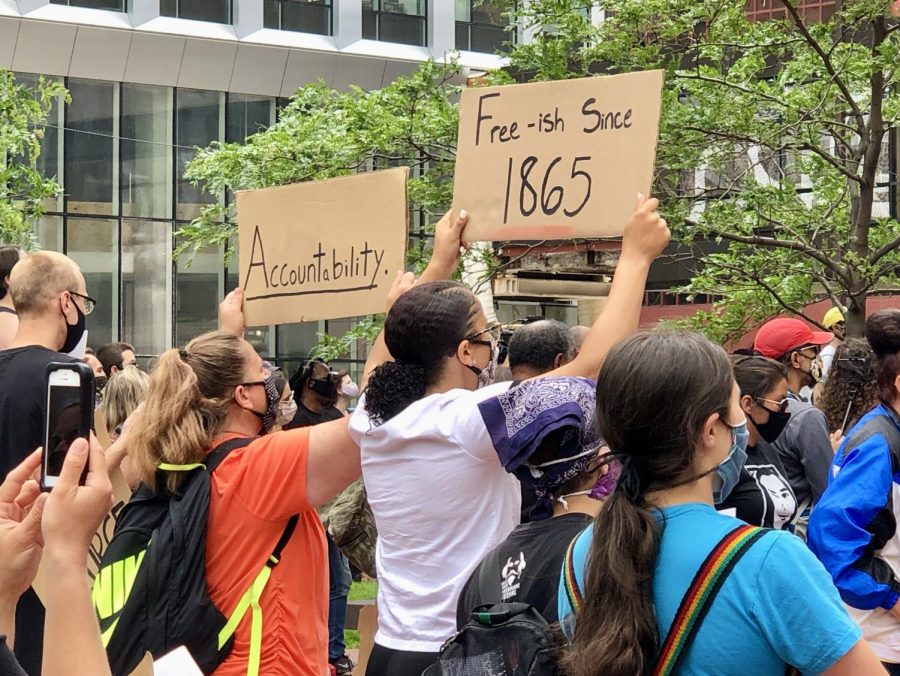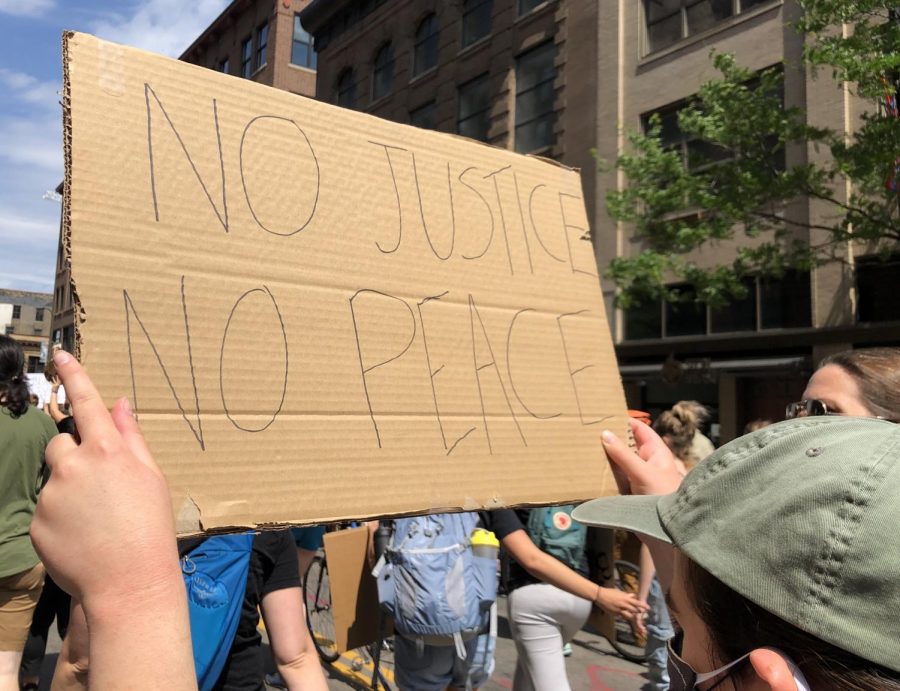No justice, no peace and no signs of stopping
Rallies and marches against police do not appear to be halting, even three weeks after the death of George Floyd.
“No justice, no peace” is one of many popular chants used by protesters in the wake of George Floyd’s death. The slogan has a long history of being used in response to racial violence.
June 15, 2020
BEFORE YOU READ: This article contains references to police brutality and sexual assault.
Amidst a global pandemic, the globe is continuing to respond with demonstrations against racism and police violence. On June 13, three weeks after the death of George Floyd, Minnesotans still took to the street demanding change. Hosted by multiple prominent Twin Cities organizations, including Black Lives Matter Minnesota and the Green Party of Minnesota, the International Solidarity Day of Protest Against Police Terror took a crowd of hundreds from the Hennepin County Government Center to Minneapolis’ First Precinct. The march was a part of the National Day of Action to Stop Police Crimes, in which 10 other cities across the country participated.
Before mask-clad protesters marched through downtown Minneapolis, leaders and community members addressed the steadily growing crowd. Activist and member of the Twin Cities Coalition 4 Justice 4 Jamar Clark (TCC4J) Monique Cullars-Doty introduced a variety of speakers, including Minnesota families who lost members due to actions taken by police. Cullars-Doty’s own nephew Marcus Golden died from police violence nearly five years ago.
One mother described how losing her son motivated her to take action for justice, which was a foreign world for her.
“I am just a hurting mother who is out here fighting to get justice for my only child,” said Del Shea Perry, whose son Hardell Sherell died from “neglect and abuse” in the Beltrami County Jail in Bemidji, Minnesota. “I have been pushed into this role as an activist and let me make that clear. I am not an activist.”

Protesters, voicing thoughts through signs, flags or T-shirts, gathered in front of the Hennepin County Government Center on a sunny Saturday afternoon as part of the International Solidarity Day of Protest Against Police Terror.
Black lives were not the only focus of the day’s event. Representatives from the newly-founded Native Lives Matter Youth Alliance were also present.
“It’s time for us to come together to show the world because the world is watching us. It’s time for us to come together to show the world we are unified no matter what color we are,” said Native Lives Matter leader Gabriel Black Elk, who stood in solidarity with the families speaking out. His brother Paul Castaway was killed by Denver police in 2015.
“Native lives matter” and “Latinx lives matter” were both chants used by protesters as they marched towards the downtown police precinct. There was also a focus on transgender lives, one day after the Trump administration removed transgender healthcare protections.
“Black trans lives matter,” called out a man representing the TCC4J. The sentiment was shared by multiple signs and flags held by protesters. Other chants included, “No justice, no peace,” and shouting the names of George Floyd and Breonna Taylor.
The march circled back to the front of the Hennepin County Government Center after holding a short rally in front of the barricaded and barb-wire fenced police precinct. Here, protesters become very vocal about their complaints. Speakers also accused the Minneapolis police of not protecting people from assault, referencing the large number of untested rape kits discovered late last year. In November 2019, Minnesota Public Radio reported the Minneapolis Police Department of having a backlog of 1,700 untested kits.
“It’s about tearing down the foundation,” said Cullars-Doty as marchers prepared to leave the area of the precinct. “That’s the foundation of America I’m talking about.”
The final group chant promised more activity, claiming boots were on the ground.



